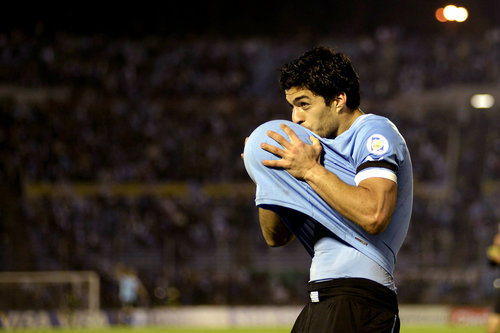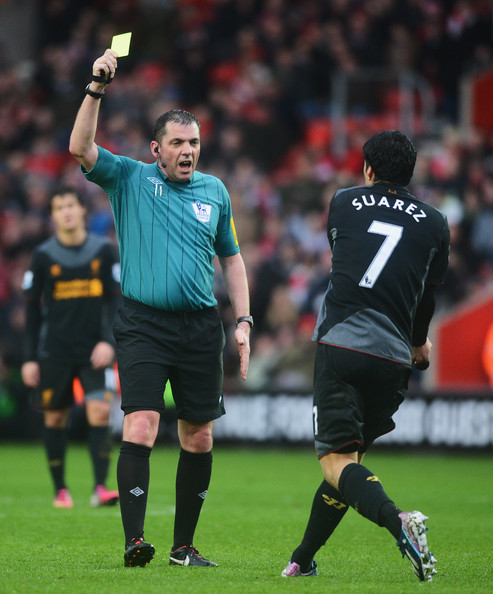All hail to the game’s great anarchist
All hail to the game’s great anarchist


Football is an institution, in more ways than one. And there are few more anti-establishment players than Luis Suarez. Not just because of his on-field theatrics and eccentric personality, but because he is the antithesis of the politically correct ideology that permeates football around the world.
Luis Suarez is perceived as a threat to that institution and is, rightly or wrongly, vilified as a result. In a way, you can call Suarez the Che Guevera of football. Although simplistic, it serves the purpose of this piece, namely to symbolize the relationship between Suarez and the institution as that of a ubiquitous rebellious figure against an inequitable structure.
Before we move on, It should be prefaced that the use of “Anarchism” here does denote the narrow and misunderstood semblance of left-wing political radicalism or pure anti-authoritarianism. Instead, like Anarchy as a doctrine—a philosophy that cannot be strictly defined and is always in flux—it is generally speaking the opposition or resistance to an unjust organizational hierarchy. For our purposes, that is a football world seemingly unified against a single player.

Furthermore, institutions represent not just football associations or supporter organizations but ideology. The ideology of the average football fan, the ideology promoted by a governing body, the ideology perpetuated by the press or even the ideology of other football players. Perception is reality and the visceral reactions Suarez elicits at football stadiums, in writing or from various pundits on television are quite overwhelming and unanimous in their disdain.
Everywhere Suarez goes, whistles and boos follow him. Referees keep an extra close eye on him in games and rarely give him the benefit of the doubt. More often than not, the judgment call on Suarez has already been made before he even steps out of the locker room. Suarez’s reputation, be it largely self-imposed, precedes him at seemingly every turn. No player lives in their own shadow more prominently than Luis Suarez. And it’s a shadow perpetuated and enlarged implicitly by the institution.
Does Suarez embellish? Yes. Has Suarez overstepped his boundaries in a football match or broken the code of the game? Without a doubt. Several times. But the real question is whether the discussion and reactions surrounding him are the result of an objective collective desire to address the biggest issues facing the game today or concentrated and simplistic scapegoating? Suarez’s intense work ethic, winning mentality and elite abilities would otherwise be celebrated but are instead overshadowed by issues that go beyond just one player.
A serious discussion about Luis Suarez’s character is impossible to have without mentioning culture. Culture breads ideology. As such, Suarez’s roots and background preface his positive and negative qualities as a player. Uruguay, like many other Latin American countries, was subjected to the pitfalls and legacies of colonial rule and external interference. Regional wars, civil conflicts, military coups and political and economic strife characterized much of the 19th and 20th century Uruguay. Throughout, a collective conscious sentiment of resistance and distrust of institutions of power grew generationally.
Take also into account Uruguay’s indigenous history and legacy. The indigenous Charrua people that have inhabited the region that is now Uruguay for over four centuries have had a lasting impact on their culture to this day. The “Garra Charrua” or the “tenacity of the Charruas” is still something prevalent in all aspects of Uruguayan culture and society, most notably in their football.
Uruguayan football has a long tradition and reputation for their ferocious fighting spirit and never-say-die attitude, something that stretches back to their historic upset against Brazil in the 1950 World Cup final all the way to their semi final run at the 2010 World Cup in South Africa to the Copa America win the year after in the country of their biggest rivals, Argentina. They have fully embraced the position of the underdog and often strive against the odds.

The combination of that ideological resistance along with that fierce spirit may explain Suarez’s on-field personality. It certainly fits the cultural mold and Uruguay’s football reputation. More importantly though, his controversial behavior also raises uncomfortable questions, throwing a spotlight on the double standard of institutional behavior. However controversial his actions, they do not exist in a vacuum, and several examples of similar behavior is prevalent around him and elsewhere.
The pretense of institutional behavior and reaction to Suarez is inherently flawed because it loses objectivity in its narrow black and white narrative. Instead of stamping out cheating or immoral and unethical behavior, singling out one player over another repeatedly preserves cracks in the system. As such, the continuous criticism of Suarez is a veil for erroneous change.
Throughout history, football culture in general has glorified the very attributes that have made Suarez such an iconic footballer, yet no conversation, no match coverage and no article is complete without reference to incidents that happened months or even years ago. Such institutional impositions empower and perpetuate rebellious behavior the same way political abuse of power creates civil disorder.
It is no wonder then that Suarez may feel like he’s battling more than just eleven players when he steps out on the field.
This post was written by Cristian Nyari, the founder of the fantastic Bundesliga Fanatic. Comments below please.







